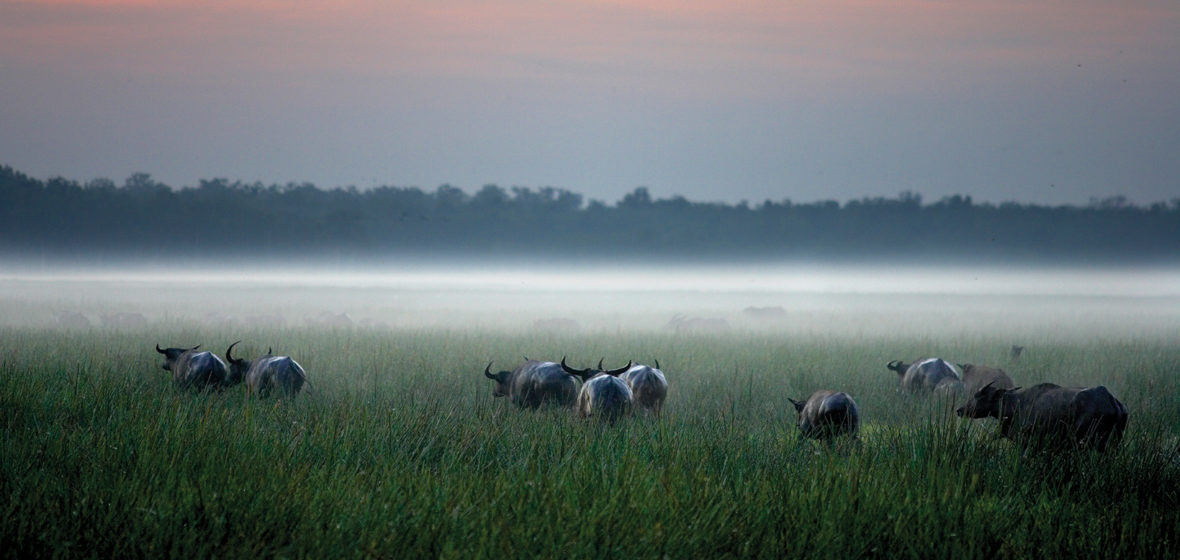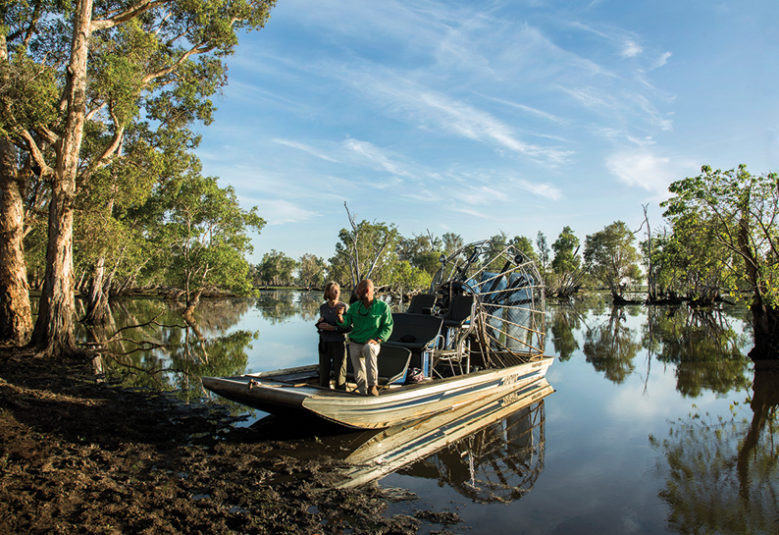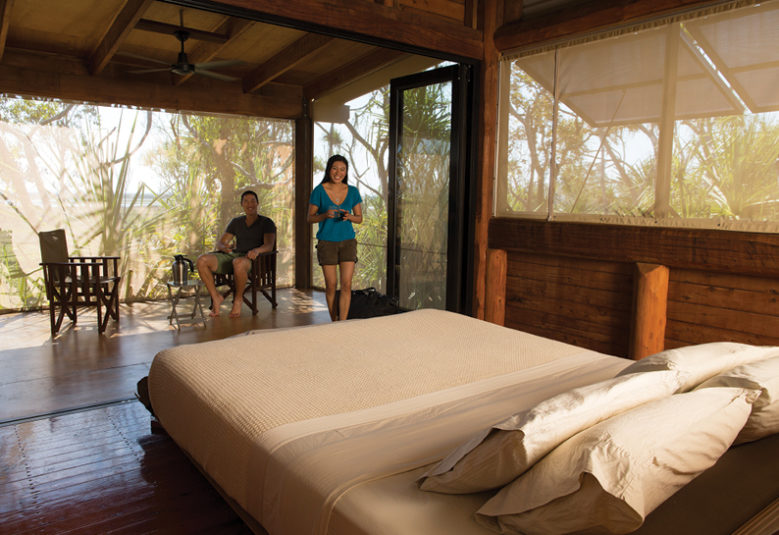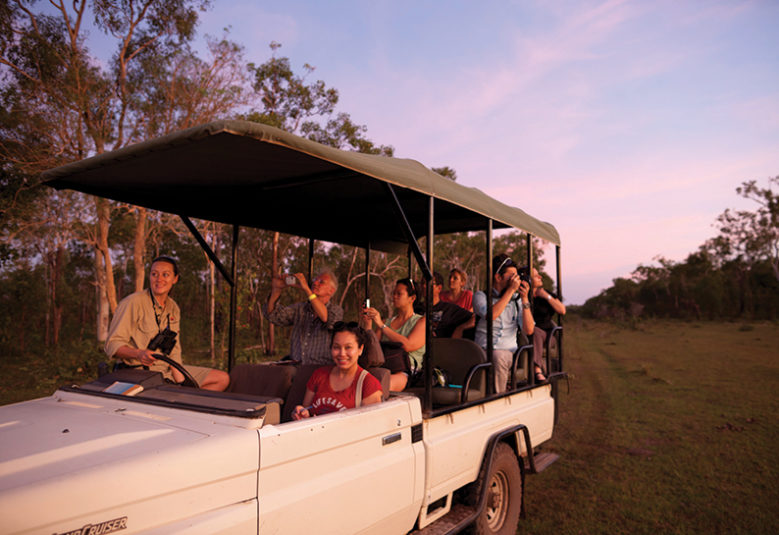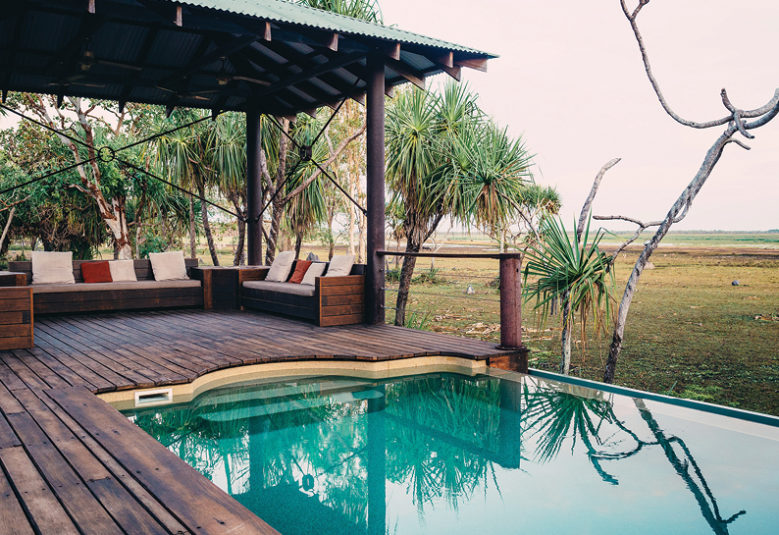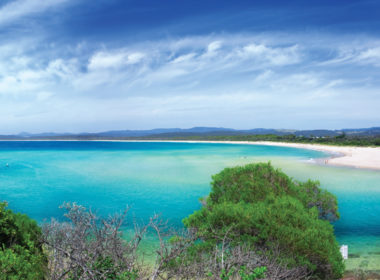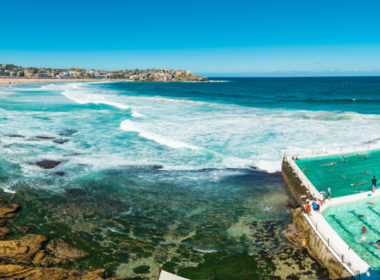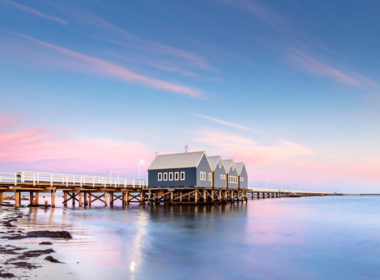This Northern Territory glamping lodge offers exotic safari tours in a uniquely Australian environment.
When was the last time you experienced complete digital detox? Not just a screen time limit, or a short-lived attempt to abandon social media by deleting an app. I mean entering digital non-existence: escaping to a place far away with zero mobile reception, Wi-Fi or TV cables, where the sun tells the time of day and news travels via UHF radios on dusty truck dashboards.
It seems hard to fathom amid the multi-platform news onslaught spurred by COVID-19; but this type of heaven exists in 2021. Even better – it’s furnished with glamping-style safari bungalows, an infinity pool and five-star dining at Bamurru Plains Lodge, in the remote Kakadu region of the Northern Territory.
The experience is the brainchild of Charles Carlow – avid traveller and millionaire founder of the Wild Bush Luxury portfolio, which also oversees Arkaba Station in the Flinders Ranges of South Australia. Word is that Carlow was inspired by safari lodges he had visited in Africa and dreamed of owning his own, Australianised version before he built and opened Bamurru in 2006. He erected 10 two-person safari bungalows, then subbed out the lions, elephants, and giraffes of the Okovango Delta for the wallabies, crocodiles, brumbies, and birdlife swarming the Mary River floodplain.
So, I don’t need international borders to open to go on safari while state borders are open to NSW residents in early June. I just need to print the driving directions from Darwin before setting out on a three-hour journey westbound along the Arnhem Highway; Google maps is due to tap out with the mobile coverage. Bamurru’s website instead offers a printable set of instructions that could have been lifted from a Poirot novel: “Cross three cattle grids, take the left fork after the big gate, find the coin-operated pay phone at the last roadhouse, call Bamurru’s landline to forecast your arrival.”
Like other elite luxury retreats, the lodge offers airborne transfers via charter flight to and from Darwin. But that route skips over the incredible enormity of Kakadu National Park – Australia’s largest park, World Heritage-listed and steeped in Aboriginal culture. Driving (or, getting lost) through frontier-like Australian savannah is half the fun.
The cryptic clues lead to a makeshift car park among the paperbark forests of Swim Creek Station, a 300-square-kilometre working cattle farm from which Bamurru leases its acreage. A lodge field guide transfers our luggage, and we clamber up into his 1970s Landcruiser safari vehicle to brr-ump along pockmarked trails for another half hour, with wallabies and water buffalo bounding out of our way.
The main lodge at Bamurru is a quintessential “home among the gumtrees” peering out from the bush over sweeping floodplains, which are underwater during the Northern Territory’s wet season while the lodge is closed from November to March. It’s a nostalgic homestead of timber and corrugated iron making quirky use of animal troughs and copper tapware for bathrooms. The chef presents three magnificent meals here daily, bringing guests around a communal dining table over lamb racks or poached eggs, but also reminds me to help myself to anything in the fridge under the all-inclusive policy. One kitchenhand even locates a cocktail recipe book and a handful of limes when I contemplate a margarita.
We disperse at 9am and 4pm each day, on animal and bird-viewing tours via Landcruiser, quad bike, river boat or even airboat – a hovercraft with a big windmill that propels a flat-bottomed dinghy over shallow marshes. We learn about crocodiles, kingfishers, magpie geese, sea eagles and my favourites, the Jacana birds – known as “Jesus birds”, for their massive webbed feet that help them hop over lily pads as if walking on water.
The digital silence is deafening, at first, for a journalist who spends most hours of the day monitoring news sites and social media. But I’m too fascinated by the sights and sounds of the natural environment to care. My new alarm is the shrill call of Whistling Kites piercing the dawn like sharp arrows through candy-pink sky. Pew-pew-pew. At breakfast I compare notes with other guests about the cacophony of bleating, squawking, honking and tweeting they heard through the night. There’s a terrifying bark we have all been woken by, which is apparently the callsign of the creatively named Barking Owl.
My phone – which is now simply an awkwardly shaped camera – is brimming with photos of blood-red sunsets, but I have no urge to open an app and share the #sunsetporn. Out here there’s no option but to go cold bush turkey.
CHECKLIST
Get there: Bamurru is a three-hour drive from Darwin city centre, or 2.5 hours from the airport. Ensure you follow the instructions mapped out on the lodge website before taking off.
Stay there: All-inclusive safari bungalows start from $1,140 per person, per night with a minimum two-night stay.
bamurruplains.com
The writer stayed on a reduced industry rate.

